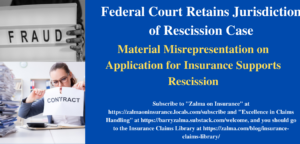Federal Court Retains Jurisdiction of Rescission Case


Karen Macko (“Mrs. Macko”) and William Stephen Mackos (“Mr. Macko”) (together, the “Mackos”) moved the court to dismiss a suit brought by their insurer seeking confirmation of the rescission of an insurance policy. In Safeport Insurance Company v. Karen Macko and William Stephen Macko, No. 9:21-cv-00131-DCN, United States District Court, D. South Carolina, Beaufort Division (December 8, 2021) the USDC resolved the claims.
BACKGROUND
The Mackos purchased a home on, Hilton Head Island, South Carolina (the “Home”). The Home is titled in the name of both Mr. and Mrs. Macko, as joint tenants with right of survivorship. In December 2018, Mrs. Macko applied for insurance for the Home with SafePort through a third-party insurance agency, American Auto Club Insurance Agency (“American Auto”). Whether the application was prepared by Mrs. Macko herself or her agent, in response to questions in the application, Mrs. Macko was identified as an unmarried individual who owned the Home outright. Further, Mrs. Macko’s application indicated that no member of her household had been convicted of a felony or other serious crime.
Mrs. Macko renewed the First Policy, at which time SafePort issued the Second Policy, to Mrs. Macko. Later, Mr. Macko was added as a named insured on the Second Policy. During the term of the Second Policy, the Mackos suffered an accidental fire loss to the Home, making it uninhabitable (“the Fire Loss”).
Shortly thereafter, the Mackos engaged Servicemaster of Beaufort, Inc., a South Carolina corporation (“Servicemaster”), to remediate the damage to the Home. According to the Mackos, they engaged Servicemaster pursuant to SafePort’s direction and recommendation. Under the Second Policy, SafePort made payments to the Mackos for loss of use of the Home and authorized Servicemaster to remove all drywall from the Home and to dispose of the Mackos’ personal contents, which were deemed a total loss.
During its investigation, SafePort discovered two alleged misrepresentations in Mrs. Macko’s application for the First Policy. First, Mrs. Macko was married, contrary to the statements in her application identifying her as unmarried and owning the Home in full. Second, Mr. Macko had been convicted of felony insurance fraud, contrary to statements in the application that no member of the household had been convicted of a felony or other serious crime. As a result, SafePort mailed Mrs. Macko a letter purportedly rescinding the First Policy ab initio based on Mrs. Macko’s “provision of inaccurate information and/or omission of accurate information in the [] application.”
SafePort, sued seeking (1) a rescission of the Policies for equitable fraud and (2) declaratory judgment that it has no obligation to the Mackos or any other person under the Policies. The next day Servicemaster filed a mechanic’s lien against the Mackos and the Home to secure alleged amounts owed for work done at the Home relating to the Fire Loss.
Before filing an answer in this federal action, the Mackos filed an answer, crossclaims, and a third-party complaint in the State Court Action. In their crossclaims, the Mackos assert bad faith and breach of contract causes of action against SafePort and seek declaratory judgment. Specifically, the Mackos asked the state court to declare that the Second Policy was in effect at the time of the Fire Loss, that SafePort’s rescission was improper, that SafePort has failed to pay benefits due under the Second Policy, and that SafePort has engaged in improper claims practices.
On March 15, 2021, the Mackos filed a motion to dismiss this federal action pursuant to the abstention doctrine claiming the two suits deal with the same issues.
DISCUSSION
Because SafePort seeks a declaration that the Policies are void ab initio and that it owes the Mackos no obligations under the Policies, the Mackos perceive the case as falling exclusively under the Declaratory Judgment Act, 28 U.S.C. § 2201. The Declaratory Judgment Act makes clear that district courts possess discretion in determining whether and when to entertain an action under the Declaratory Judgment Act, even when the suit otherwise satisfies subject matter jurisdictional prerequisites.
SafePort claimed that it has brought a non-declaratory judgment claim of rescission which is within the jurisdiction of the federal court. While wise judicial policy and extraordinary circumstances may justify dismissal, courts must remain cognizant that abstention from the exercise of federal jurisdiction is the exception not the rule.
Rescission is a non-declaratory claim that a court must entertain unless there are extraordinary and narrow circumstances exist. To ensure that they have asked for all available relief, plaintiffs commonly add a request for declaratory relief in addition to requests for equitable or monetary relief. The USDC declined to adopt a rule that would transform that thoroughness into a handicap.
Two conditions must be present for a court to decline jurisdiction: First, there must be parallel proceedings in state and federal court. Second, exceptional circumstances warranting abstention must exist.
Parallel Proceedings
Suits are parallel if substantially the same parties litigate substantially the same issues in different forums. Because of the additional parties in the State Court Action, the parties are not facially the same.
SafePort argues that the lawsuits do not litigate substantially the same issues because the primary complaint in the State Court Action involves Servicemaster’s attempts to recover for the work it completed at the home.
Both actions involve the factual issues of whether Mrs. Macko made misrepresentations in her insurance application and whether SafePort relied on those misrepresentations in issuing the Policies. Both actions likewise involve the legal issues of whether the Policies are void ab initio and whether SafePort is liable for any portion of the Fire Loss. Still, the court’s analysis is complicated by the fact that SafePort seeks the additional remedy of rescission in this action and does not assert that cause of action in the State Court Action.
State and federal claims arising out of the same factual circumstances do not qualify as parallel if they differ in scope or involve different remedies. Rather, a federal court may abstain only if it concludes that the parallel state-court litigation will be an adequate vehicle for the complete and prompt resolution of the issues between the parties. If there is any serious doubt that the state action would resolve all of the claims, it would be a serious abuse of discretion to abstain. Because SafePort’s rescission cause of action is not asserted in the State Court Action, the State Court Action would not resolve all of the claims before this court, which supports a finding that the actions are not parallel.
The court did not not find that circumstances or justification for abstention exist in the case brought by SafePort. Therefore, the court found it was required to support its virtually unflagging obligation to exercise its jurisdiction over the instant matter properly before it.
People who defraud insurance companies or obtain insurance under false pretenses prefer to litigate against their insurer in state court. The Macko’s, before responding to the Federal Action responded to a state court action to enforce a contractor’s lien and expanded it to cover some of the issues in federal action and then claim the two actions are parallel. The attempt properly failed and the rescission action can be resolved in federal court and, based on the record of misrepresentations and concealment of material facts – the prior insurance fraud conviction of Mr. Macko – should be dispositive. The jurisdictional ploy to avoid federal court failed.
© 2022 – Barry Zalma
Barry Zalma, Esq., CFE, now limits his practice to service as an insurance consultant specializing in insurance coverage, insurance claims handling, insurance bad faith and insurance fraud almost equally for insurers and policyholders.
He also serves as an arbitrator or media tor for insurance related disputes. He practiced law in California for more than 44 years as an insurance coverage and claims handling lawyer and more than 54 years in the insurance business.
tor for insurance related disputes. He practiced law in California for more than 44 years as an insurance coverage and claims handling lawyer and more than 54 years in the insurance business.
Subscribe to “Zalma on Insurance” at https://zalmaoninsurance.locals.com/subscribe and “Excellence in Claims Handling” at https://barryzalma.substack.com/welcome.
You can contact Mr. Zalma at https://www.zalma.com, https://www,claimschool.com, zalma@claimschool.com and zalma@zalma.com . Mr. Zalma is the first recipient of the first annual Claims Magazine/ACE Legend Award.
You may find interesting the podcast “Zalma On Insurance” at https://anchor.fm/barry-zalma; you can follow Mr. Zalma on Twitter at; you should see Barry Zalma’s videos on YouTube- https://www.youtube.com/channel/UCysiZklEtxZsSF9DfC0Expg; or videos on https://rumble.com/zalma. Go to the Insurance Claims Library – https://zalma.com/blog/insurance-claims–library/ The last two issues of ZIFL are available at https://zalma.com/zalmas-insurance-fraud-letter-2/
Like this:
Loading…







